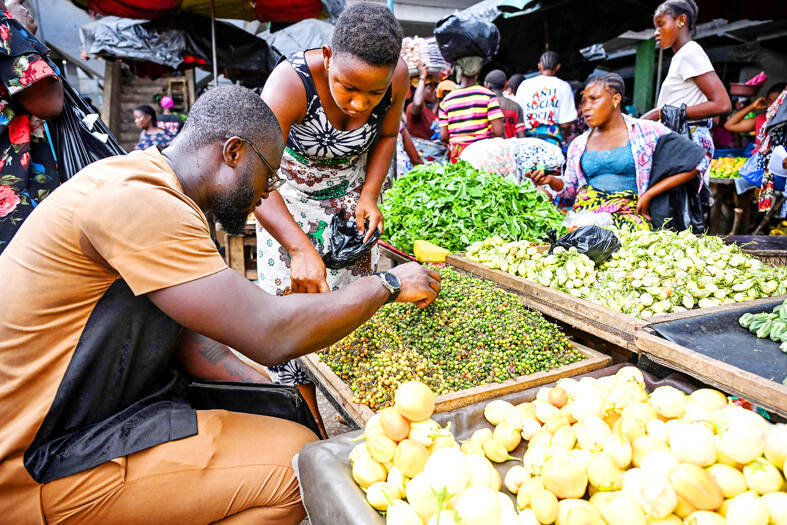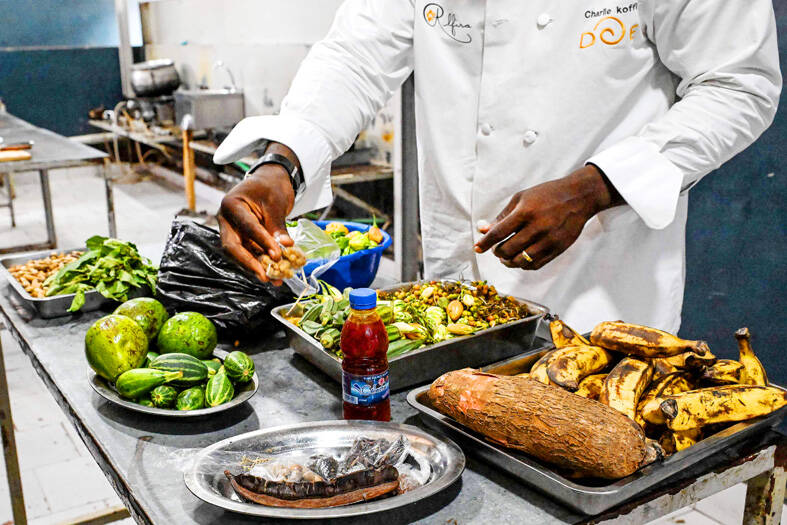In the kitchen of his restaurant in Abidjan, Ivory Coast, chef Charlie Koffi prepares his country’s staggering tropical bounty with the techniques of fine French cuisine, and he is far from alone.
A growing number of chefs in the West African nation are retouching local specialties with cooking skills picked up elsewhere.
One of Koffi’s signature dishes is an adaptation of gouagouassou sauce, a local specialty. In his version, a rabbit is stewed with African eggplants, spicy oil, powdered akpi seeds and local fefe pepper.

Photo: AFP
“It is one of the dishes I really loved as a child,” Koffi said. “As a chef, it was almost an obligation to come back to it.”
Koffi was trained in France before opening his restaurant, Villa Alfira, in 2017 to showcase his country’s cuisine.
In the well-lit main dining room overlooking a pond where fish on the menu swim, customer Eric Guei tucked into a gouagouassou casserole.

Photo: AFP
“I find taste and audacity in this dish,” Guei said. “It mixes Western know-how with local flavors.”
He was eating the copious, but beautifully presented meal with his friend Yasmine Doumbia. “Gouagouassou is a very traditional Ivory Coast dish, and to see it in a restaurant like this is a real pleasure,” she said.
Villa Alfira is a change from the maquis, typical animated local eateries where braised chickens and fish are eaten by hand, along with traditional sauces, manioc polenta and fried plantains.
A few kilometers away, a chef at upscale restaurant La Maison Palmier is working on her new creation: a taster dish inspired by placali, a typical Ivorian dish made with sticky gumbo sauce, bits of meat and dried fish, accompanied by fermented manioc paste.
Hermence Kadio, who trained locally, has her own much lighter take on the classic. She grills the gumbo (okra), while the cassava is puffed up and turned into chips.
Every week the restaurant’s French head chef Matthieu Gasnier said he offers amuse-bouche — small bite-sized appetisers — like these to “reawaken the memories of people who grew up with these dishes,”
About half his clientele is Ivorian, he said.
“Even if our restaurant’s cuisine is intended to be international since we are in a five-star hotel, I think it would be wrong not to take advantage of all these beautiful products that surround us,” he said.
Grains such as fonio and sorghum grow in the Ivory Coast’s hot dry northern savannas, while the forested south produces local varieties of spinach and typical tropical products, such as bananas and yams, Koffi said.
N’Cho Yapi, who founded the group Chefs: Creators of Emotions, said that Ivorian cooks began going back to their culinary roots just after the turn of the century.
Before that, chefs at fancy restaurants “had the habit of offering Western dishes with imported products, but the cost of living kept going up,” so they turned to less-expensive products “they had just under their noses,” he said.
Local specialties are appearing more on the menus of the luxury restaurants that have mushroomed across Abidjan in the past few years, Yapi added.
Valerie Rollainth, an Ivorian chef trained in France at the famous Institut Paul Bocuse, said that typically hearty Ivorian cuisine is no longer suited to the capital’s increasingly sedentary lifestyle. “There are too few vegetables, a shocking quantity of oil and the dishes are cooked too long” and lose their nutrients, she said.
At the nutritional workshops Rollainth organizes she said she urges people to eat local products in new ways, such as raw okra, which “is very good against diabetes.”
“Some diseases are linked to eating habits,” she said. “In the Ivory Coast, not everyone has access to healthcare, but everyone has access to healthy food.”

Taiwan Semiconductor Manufacturing Co (TSMC, 台積電) secured a record 70.2 percent share of the global foundry business in the second quarter, up from 67.6 percent the previous quarter, and continued widening its lead over second-placed Samsung Electronics Co, TrendForce Corp (集邦科技) said on Monday. TSMC posted US$30.24 billion in sales in the April-to-June period, up 18.5 percent from the previous quarter, driven by major smartphone customers entering their ramp-up cycle and robust demand for artificial intelligence chips, laptops and PCs, which boosted wafer shipments and average selling prices, TrendForce said in a report. Samsung’s sales also grew in the second quarter, up

LIMITED IMPACT: Investor confidence was likely sustained by its relatively small exposure to the Chinese market, as only less advanced chips are made in Nanjing Taiwan Semiconductor Manufacturing Co (TSMC, 台積電) saw its stock price close steady yesterday in a sign that the loss of the validated end user (VEU) status for its Nanjing, China, fab should have a mild impact on the world’s biggest contract chipmaker financially and technologically. Media reports about the waiver loss sent TSMC down 1.29 percent during the early trading session yesterday, but the stock soon regained strength and ended at NT$1,160, unchanged from Tuesday. Investors’ confidence in TSMC was likely built on its relatively small exposure to the Chinese market, as Chinese customers contributed about 9 percent to TSMC’s revenue last

LOOPHOLES: The move is to end a break that was aiding foreign producers without any similar benefit for US manufacturers, the US Department of Commerce said US President Donald Trump’s administration would make it harder for Samsung Electronics Co and SK Hynix Inc to ship critical equipment to their chipmaking operations in China, dealing a potential blow to the companies’ production in the world’s largest semiconductor market. The US Department of Commerce in a notice published on Friday said that it was revoking waivers for Samsung and SK Hynix to use US technologies in their Chinese operations. The companies had been operating in China under regulations that allow them to import chipmaking equipment without applying for a new license each time. The move would revise what is known

UNCERTAINTY: A final ruling against the president’s tariffs would upend his trade deals and force the government to content with billions of dollars in refunds The legal fight over US President Donald Trump’s global tariffs is deepening after a federal appeals court ruled the levies were issued illegally under an emergency law, extending the chaos in global trade. A 7-4 decision by a panel of judges on Friday was a major setback for Trump, even as it gives both sides something to boast about. The majority upheld a May ruling by the Court of International Trade that the tariffs were illegal. However, the judges left the levies intact while the case proceeds, as Trump had requested, and suggested that any injunction could potentially be narrowed to apply